

Complexity & Management Centre. Previous blogs have outlined key features of the theory of complex responsive processes of relating between members of organisations as a way of making more sense of what we actually do in our everyday lives in those organisations.
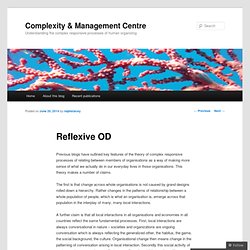
This theory makes a number of claims. The first is that change across whole organisations is not caused by grand designs rolled down a hierarchy. Predictability and Organisations. Yesterday, I was struck by an article in the Business Section of the Sunday Times with this heading: Directors told to predict future under new code.
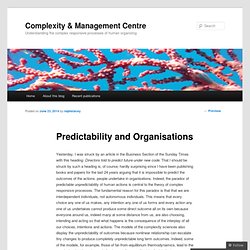
That I should be struck by such a heading is, of course, hardly surprising since I have been publishing books and papers for the last 24 years arguing that it is impossible to predict the outcomes of the actions people undertake in organisations. Indeed, the paradox of predictable unpredictability of human actions is central to the theory of complex responsive processes. The fundamental reason for this paradox is that that we are interdependent individuals, not autonomous individuals. Reflective practice. Reflective practice is the capacity to reflect on action so as to engage in a process of continuous learning.[1] According to one definition it involves "paying critical attention to the practical values and theories which inform everyday actions, by examining practice reflectively and reflexively.
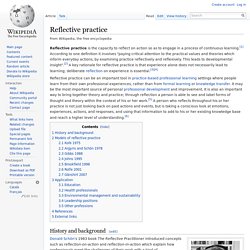
This leads to developmental insight".[2] A key rationale for reflective practice is that experience alone does not necessarily lead to learning; deliberate reflection on experience is essential.[3][4] Reflective practice can be an important tool in practice-based professional learning settings where people learn from their own professional experiences, rather than from formal learning or knowledge transfer. It may be the most important source of personal professional development and improvement. History and background[edit] Professor Emeritus Donald Schön.
The importance of the complexity sciences for management and leadership. The importance of the complexity sciences for management and leadership Posted on Updated on I want to continue with two more postings about the deepening crisis of leadership and ethics, and thought that I would put this up first for those who might not be familiar with the how we are motivated by the complexity sciences in our research on managing, leading and organizational change at the University of Hertfordshire as opposed to others who are directly importing concepts from the complexity sciences into understanding human social interaction.
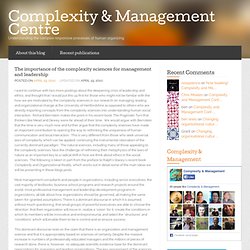
Repetitive Patterns of Communication: Thought Collectives and Thought Styles. Repetitive Patterns of Communication: Thought Collectives and Thought Styles Posted on Updated on There seems to me to be an interesting pattern in the comments on many of the blogs on this site, a pattern that I frequently encounter in many other discussions in organizations too.
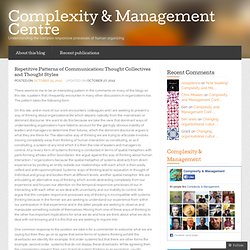
The pattern takes the following form. On this site, and in most of our work encounters, colleagues and I are seeking to present a way of thinking about organizational life which departs radically from the mainstream or dominant discourse. We want to do this because we take the view that dominant ways of understanding organizations have failed to account for the glaringly obvious inability of leaders and managers to determine their futures, which the dominant discourse argues is what they are there for. Acting into organizational complexity: comparing and contrasting relational leadership and complex responsive processes of relating. Acting into organizational complexity: comparing and contrasting relational leadership and complex responsive processes of relating Posted on Updated on At the Complexity and Management Conference 2013 our guest speaker, Ann Cunliffe, described her ideas about what she terms relational leadership, which are also set out in an article in Human Relations here.
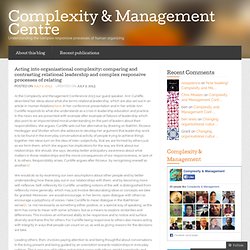
Conforming and resisting. Thinking with and within institutions. In her book How Institutions Think (1986) the social anthropologist Mary Douglas, who died in 2007, struggles with the paradox of the individual and the social.
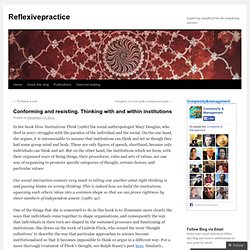
On the one hand, she argues, it is unreasonable to assume that institutions can think and act as though they had some group mind and body. These are only figures of speech, shorthand, because only individuals can think and act. But on the other hand, the institutions which we form, with their organised ways of doing things, their procedures, rules and sets of values, are one way of organising to promote specific categories of thought, certain choices, and particular values: Our social interaction consists very much in telling one another what right thinking is and passing blame on wrong thinking.
This is indeed how we build the institutions, squeezing each others’ ideas into a common shape so that we can prove rightness by sheer numbers of independent assent. (1986: 91) Ralph D. Stacey; Strategic Management and Organisational Dynamics « Tværfaglighed i Entrepreneurship. Chapter 14 – “Strategy as the emergence of organisational identity” seeks to exploit a theory by Elias who emphasizes how individual personality structures and society emerge simultaneously and thereby evolves over time.
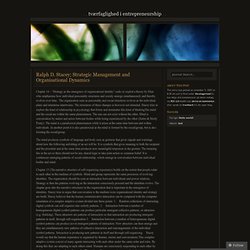
The organisation seen as personality and social structures evolves as the individual plans and intentions intertwines. Review of Seeing Like a State. J. Bradford DeLong delong@econ.berkeley.edu James Scott (1998), Seeing Like a State: How Certain Schemes to Improve the Human Condition Have Failed (New Haven: Yale University Press: 0300070160). I. Introduction There is a lot that is excellent in James Scott's Seeing Like a State .
On one level, it is an extraordinary well-written and well-argued tour through the various forms of damage that have been done in the twentieth century by centrally-planned social-engineering projects--by what James Scott calls "high modernism" and the attempt to use high modernist principles and practices to build utopia. This book marks the final stage because it shows the spread of what every economist would see as "Austrian ideas" into political science, sociology, and anthropology as well. No one can finish reading Scott without believing--as Austrians have argued for three-quarters of a century--that centrally-planned social-engineering is not an appropriate mechanism for building a better society. II.
III. Appreciative Inquiry as a variety of religious experience « Reflexivepractice. In an article in the journal AI (Appreciative Inquiry) Practitioner in 2012, the author and AI practitioner Gervase Bushe quotes from some of his personal correspondence with one of the founders of AI, David Cooperrider.
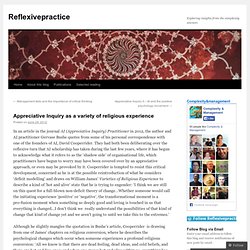
They had both been deliberating over the reflexive turn that AI scholarship has taken during the last few years, where it has begun to acknowledge what it refers to as the ‘shadow side’ of organisational life, which practitioners have begun to worry may have been covered over by an appreciative approach, or even may be provoked by it. He becomes conscious that this higher part is coterminous and continuous with a MORE of the same quality, which is operative in the universe outside of him, and which he can keep in touch with, and in a fashion get on board of and save himself when all his lower being has gone to pieces in the wreck. What is AI? Starting with the principles, AI claims to be a positive, strength-based approach to change.